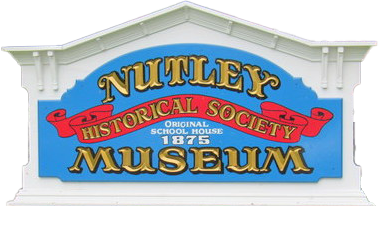Authors of Nutley
HISTORY OF NUTLEY, 1907
ELIZABETH STOW BROWN
THE two names that head the list of Nutley authors are Frank R. Stockton and Henry C. Bunner. Stockton was born in Philadelphia in 1834. He was one of nineteen children. His mother, who was his father’s second wife, brought to the old New Jersey stock a mixture of French and Irish blood, which may partly account for the capricious charm of Stockton’s fancies. In 1860, he married Miss Marion Tuttle of Virginia and soon after, came to Nutley to live. About this time he took a position on Hearth and Home, and in 1873 became associate editor of St. Nicholas. “Rudder Grange” was at first a story which he wrote for Scribner’s. Its cordial reception led him to enlarge it to the present delightful volume. This was the first book he wrote for “grown-ups,” although the elders had long been reading his children’s tales with delight. Then followed years of giving out his unique stories, quaint, impossible fancies told in a straightforward, matter of fact manner which made any questioning of their probability seem quite preposterous. Eggleston said there was one chamber of Stockton’s mind denied to other brains. “The Lady or the Tiger?,” written, so it has been said, for an evening party at Mr. Boardman’s in Nutley, has been translated into many languages, and one day in India a group of Hindus were heard gravely discussing the probable fate of the hero. Stockton came to Nutley because of his friendship for William H. Boardman, who is the boarder in “Rudder Grange.” The Stocktons lived in the house on 203 Walnut Street near Nutley Avenue.

The principal works of Stockton are: Rudder Grange, The Rudder Grangers Abroad, The Lady or the Tiger?, The Late Mrs. Null, The Casting Away of Mrs. Lecks and Mrs. Aleshine, The Dusantes, The Hundredth Man, Personally Conducted, The Merry Chanter, The Squirrel Inn, The Watchman’s Wife, Pomona’s Travels.
Henry C. Bunner was not born in Nutley, but lived here many years before his death in 1896. Much of his poetry and storytelling breathes the atmosphere of his adopted neighborhood. He was born in Oswego, New York, in 1855. He was educated in New York and started upon a business career. Finding this most uncongenial he entered journalism in 1873, and began his editorship of Puck in 1877. With his wit and humor he had nevertheless the gentle delicacy of the poet, and it is perhaps by his verses that he will be longest remembered. Bunner dearly loved his Nutley home. Every nook and corner of the house, every inch of garden was dear to him. He built the little log cabin for his daughter Nancy. He is accused of having had thirteen different kinds of fence, each with some pet purpose of its own. He writes to Lawrence Hutton, “When you push your way up the Passaic Valley where Irving, Hoffman, and Frank Forrester lived, come up and see a fellow named Bunner, who lives up that way in the House of Spare Bedrooms. We’ve vaccinated a baby to-day, we keep a pig, two dogs, two cats and are contemplating a donkey.” Mr. Bunner’s warmth of heart was shown in his instructions to the doctor of the town that he might call on him for any expense in connection with the illness of his needy patients. To make this help more lasting he originated the plan of an entertainment, the proceeds of which were to go to a Red Cross Fund for Nutley. This famous Amateur Circus brought into its program all the available talent of the town. It was a memorable occasion for Nutley. The railroad even ran special trains to bring people from New York and the adjoining towns.
Bunner’s principal works are: The Midge, Airs from Arcady, Natural Selection, Story of a New York House, Short Sixes, Zadoc Pine, Jersey Street and Jersey Lane, and The Suburban Sage.
A Native of Nutley was Dr. H. H. Rusby, Professor of Materia Medica, University and Bellevue Medical College; Professor of Botany, Physiology and Materia Medica in the New York College of Pharmacy, Columbia University; Curator of the Museum of the New York Botanical Garden; and member of many learned societies at home and abroad. Dr. Rusby when but a boy showed a great interest in botany. He began the formation of an Essex County herbarium, which, finished in after years, received a Centennial medal as the most complete offered from a single locality. In 1879 the New Jersey Botanical Club was formed with Dr. Rusby as its President. In 1880 he was sent by the Smithsonian Institution to the southwest to explore the flora of that region. In 1885 he was commissioned to visit South America, to investigate the medicinal plants of the Amazon. Altogether he has contributed several hundred new species to our pharmacopoeia. He has written a number of important books on Plants and Materia Medica and a still larger number of pamphlets and scientific articles, as well as a “History of the New York College of Pharmacy.”
